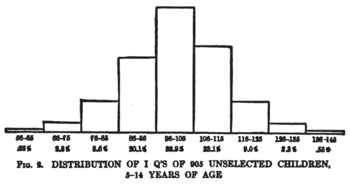
IQ classification is the practice of categorizing human intelligence, as measured by intelligence quotient (IQ) tests, into categories such as "superior" and "average".[1][2][3][4]
In the current IQ scoring method, an IQ score of 100 means that the test-taker's performance on the test is of average performance in the sample of test-takers of about the same age as was used to norm the test. An IQ score of 115 means performance one standard deviation above the mean, while a score of 85 means performance one standard deviation below the mean, and so on.[5] This "deviation IQ" method is now used for standard scoring of all IQ tests in large part because they allow a consistent definition of IQ for both children and adults. By the current "deviation IQ" definition of IQ test standard scores, about two-thirds of all test-takers obtain scores from 85 to 115, and about 5 percent of the population scores above 125 (i.e. normal distribution).[6]
When IQ testing was first created, Lewis Terman and other early developers of IQ tests noticed that most child IQ scores come out to approximately the same number regardless of testing procedure. Variability in scores can occur when the same individual takes the same test more than once. [7][8] Further, a minor divergence in scores can be observed when an individual takes tests provided by different publishers at the same age. [9] There is no standard naming or definition scheme employed universally by all test publishers for IQ score classifications.
Even before IQ tests were invented, there were attempts to classify people into intelligence categories by observing their behavior in daily life.[10][11] Those other forms of behavioral observation were historically important for validating classifications based primarily on IQ test scores. Some early intelligence classifications by IQ testing depended on the definition of "intelligence" used in a particular case. Current IQ test publishers take into account reliability and error of estimation in the classification procedure.
- ^ Cite error: The named reference
Wechsler1958cp3was invoked but never defined (see the help page). - ^ Cite error: The named reference
Matarazzo1972cp5was invoked but never defined (see the help page). - ^ Cite error: The named reference
Gregory1995was invoked but never defined (see the help page). - ^ Cite error: The named reference
Kamphaus2005pp518–20was invoked but never defined (see the help page). - ^ Cite error: The named reference
Gottfredson2009pp31–32was invoked but never defined (see the help page). - ^ Cite error: The named reference
Hunt2011p5was invoked but never defined (see the help page). - ^ Cite error: The named reference
Aiken1979p139was invoked but never defined (see the help page). - ^ Cite error: The named reference
Anastasi1997p326was invoked but never defined (see the help page). - ^ Cite error: The named reference
Kaufman2009pp151-153was invoked but never defined (see the help page). - ^ Cite error: The named reference
TermanOldClasseswas invoked but never defined (see the help page). - ^ Cite error: The named reference
WechslerOldClasseswas invoked but never defined (see the help page).